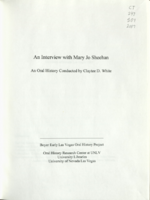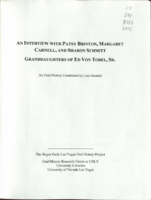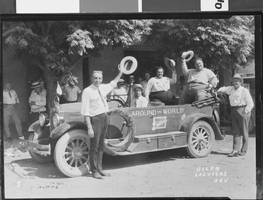Search the Special Collections and Archives Portal
Search Results

Transcript of interview with Mary Jo Sheehan by Claytee D. White, July 14, 2009
Date
Archival Collection
Description
Mary Jo Sheehan shares detailed memories of her family's early history, her father's search for work in mines in Oklahoma, Colorado, New Mexico, and Arizona, and her education through high school. She recalls with clarity the family's move to Henderson in 1945, her first job at Nellis Air Force Base, and their home in Victory Village. Mary Jo recalls bowling at the Emerald Casino, joining a sorority, and dining at the Frontier Hotel as part of her social life. She also remembers where she and her husband met in 1963. They were married at a friend's house first and later recommitted in a ceremony at St. Peter's Catholic Church. In recounting her career, Mary Jo talks of working at Nellis Air Force Base, then RFC War Assets Administration, the Colorado River Commission, and Basic Management Incorporated. Most recently she has done volunteer work for St. Rose Hospital and the Clark County Museum. Mary Jo shares many memories from her long history in Henderson, Nevada. These include events such as the PEPCON explosion in 1988 and the renovation of downtown Henderson beginning in the 90s; people like Hal Smith, Pat McCarran, and Selma Bartlett; and places such as the Swanky Club, the Emerald Casino, and the Black Mountain Golf Course. The fascinating end result is an overview of all the growth and changes in Henderson since the late forties.
Text

Transcript of interview with Patsy Brinton, Margaret Carnell, and Sharon Schmitt by Lois Goodall, April 30, 2014
Date
Archival Collection
Description
In 1905 a twenty-two-year-old second-generation Swiss American left Los Angeles with a friend for Lincoln County, Nevada. Edward "Ed" Von Tobel (1873-1967) and his friend Jake Beckley had heard about some land that was going up for auction. Together they purchased a parcel on the second day in the new desert town of Las Vegas, where they established Von Tobel's Lumber Company, which served Southern Nevada from 1905 until it closed in 1976. In Las Vegas Von Tobel met and married fellow German-speaker Mary Hameril, and together the couple raised four children in the city: Jake, Katherine Elizabeth, Ed Jr., and George. Many Von Tobel descendants live here still. Margaret Carnell, granddaughter of Ed Von Tobel and Mary Hameril and the oldest of three daughters of Elizabeth Von Tobel and Kenneth Zahn, was born in Las Vegas in 1939. After attending Arizona State University Margaret married in Phoenix, Arizona, in 1958 Margaret raised two children in Scottsdale, Arizona, before returning to Las Vegas in 1983. Margaret manages the Von Tobel family properties and in her spare time likes to travel. Patricia "Patsy" Brinton is the second daughter of Elizabeth Von Tobel and Kenneth Zahn. Like her sisters Patsy was raised in Las Vegas, where in 1972 she married real estate broker Robert Brinton. The Brintons raised two daughters and a son. Like her cousin Sharon, Patsy donates considerable volunteer hours through Assistance League of Las Vegas and Junior League of Las Vegas. Patsy enjoys traveling and playing golf and tennis. Sharon Schmitt, the second of four daughters of Edward Von Tobel Jr. and Evelyne Leonard, was born in Las Vegas in 1940. In 1963 in Las Vegas Sharon married Larry Schmitt, an agent for Allstate Insurance. Besides enjoying traveling and playing tennis, Sharon has long been an active community volunteer through Assistance League of Las Vegas, Junior League of Las Vegas, and Saint Elizabeth Ann Seton Catholic Church. Together the Schmitts raised a family of three children, who still live in Las Vegas and are raising the next generation of the Von Tobel family.
Text

Photograph of the Around the World Buick, Las Vegas, circa early 1900s
Date
Archival Collection
Description
Image

Transcript of interview with Jimmy Gay by Perry Kaufman, April 12, 1972
Date
Archival Collection
Description
Interview with James A. Gay III conducted by Perry Kaufman on April 12, 1972. Arriving in 1946 from Fordyce, Arkansas, Gay became the first African-American mortician in Las Vegas. He later worked as Assistant Manager of the Sands Hotel and Casino and Union Plaza while serving as an executive board member of the Culinary Union. Instrumental in the Las Vegas community, Gay worked to improved race relations, addressing social, economic, and civic issues. Gay was awarded an honorary degree from the University of Nevada, Las Vegas in 1988.
Text

Transcript of interview with Thomas Barbarite by Dennis Chamberland, March 3, 1981
Date
Archival Collection
Description
Text

Transcript of interview with Barbara Barnett by Charles Chesnutt, March 8, 1981
Date
Archival Collection
Description
Text

Transcript of interview with Lendon Kaye Barney by Kelly Adams, March 3, 1978
Date
Archival Collection
Description
Text

Transcript of interview with John Brooks by Jeff Kennedy, February 28, 1979
Date
Archival Collection
Description
Text

Transcript of interview with Charles Adams by Mike Lommori, February 28, 1980
Date
Archival Collection
Description
Text

Transcript of interview with Hazel Gay by Claytee D. White, December 2, 1995
Date
Archival Collection
Description
Interview with Hazel Gay conducted by Claytee D. White on December 2, 1995. Hazel and her husband Jimmy Gay moved to Las Vegas in 1946, becoming leaders in the African American community during the civil rights era.
Text
